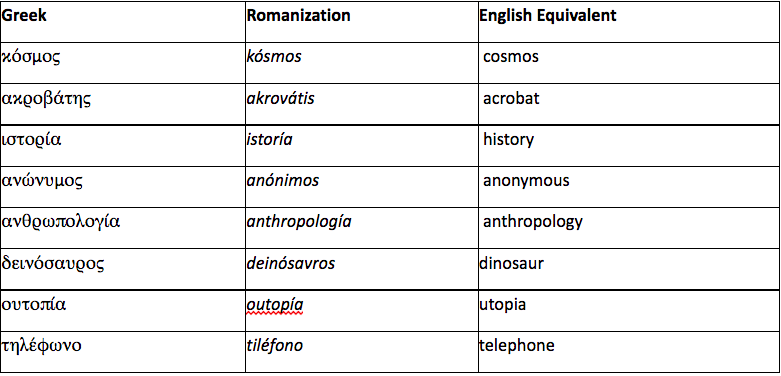
Is Greek a Hard Language To Learn?
Of all European languages, studies show that Greek is among the most difficult not only for native English speakers, but those who speak Romance languages as well. This is in part because it is unrelated to other Indo-European languages, despite Greece’s geographical proximity to many other countries and its importance throughout world history. While its alphabet and difficult grammar present obstacles to new learners, Greek’s influence on other languages provides students with a step on the way towards mastery.
Many English Words Have Greek Origin
Luckily, there are many words within the English language that have Greek roots. Understanding the etymology of English words derived from Greek will jump start any new student’s vocabulary in the Greek language. Take the word ‘alphabet,’ for example, one of the first words native English speakers learn. It comes from the first two letters of the Greek alphabet, ‘alpha’ and ‘beta.’
Many English words used for technical, academic, or scientific terms are derived from Greek. The ability to associate Greek words easily with English counterparts is essential when building a new vocabulary to aid in memory retention. Take a look at the table below to get an idea for several Greek words you already know!

Greek Pronunciation
Pronunciation can be a difficult task when learning any new language. Greek presents a particular challenge in that some letters of its alphabet look similar to English letters, but they are not pronounced the same. For example, ‘P’ and the Greek ‘P.’ Greek’s ‘P’ or rho is closer to the English ‘R’ sound. Greek’s “B” or beta sounds more like a /v/ than English’s “B.” It is therefore important to master the Greek alphabet in order to build a foundation for proper pronunciation.
The best way to learn proper pronunciation of Greek words is directly from a native speaker who can coach you through each new word you learn. The Greek letters “Θ / θ” (theta) and “Δ / δ” (delta) sound to an English speaker very similar to each other, like our “th.” Listen closely to a native speaker to understand the subtle difference; Θ / θ is a harder “th” sound, as in “Thor” or “thesis” while Δ / δ are a softer “th” more akin to the word “this.” With practice and attention to detail, students will grasp even the more difficult aspects of Greek pronunciation. Watch the video below to see what longtime learners of Greek continue to find difficult with the language:
Greek Grammar
An additional aspect of the Greek language that many new learners have found challenging is its grammar. Greek uses not only masculine and feminine descriptors for nouns but has a neutral gender, too. Additionally, Greek uses four cases, although three are most frequently used. The case used changes the ending of a noun depending on the purpose of the sentence. For example, the vocative case is used when addressing someone directly.
While it is important to know grammar basics, many grammatical rules can be learned through consistent exposure to the language. Consider the grammatical rules of English – while you may be able to describe some of the rules in detail, most are learned through repetition and incorrect grammar will look or sound incorrect. The same goes for Greek! Although the grammar may seem difficult to grasp at first, repeated exposure to written and spoken Greek will aid in understanding its grammar.
Learn Greek Online with LanguageBird!
Although learning Greek certainly has its challenges, it is still well worthwhile! The ability to speak Greek opens the door to communicating with millions of native speakers and creates a deeper understanding and appreciation for the Greek diaspora’s rich history and culture. Learning Greek in a one-to-one format from a native-level instructor is the best way to achieve proper pronunciation, learn grammar, and master the language. Contact us to learn more today!



